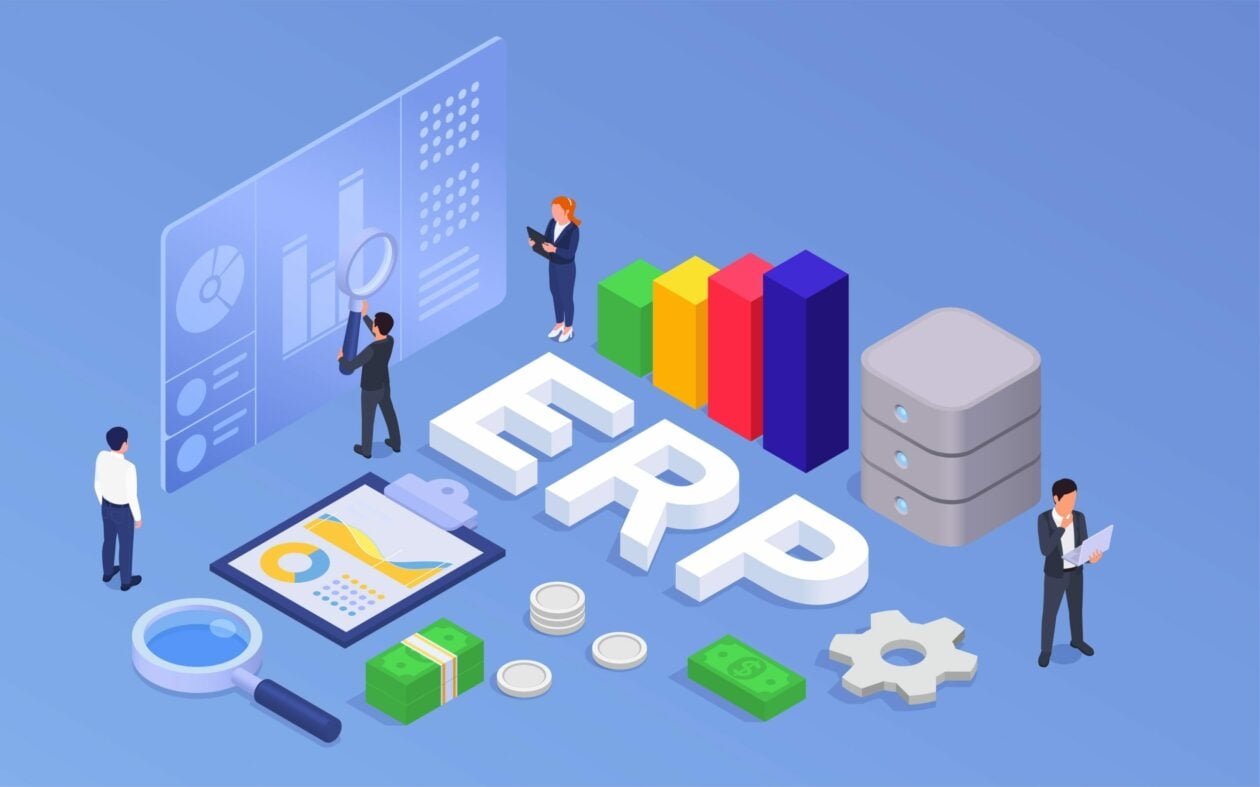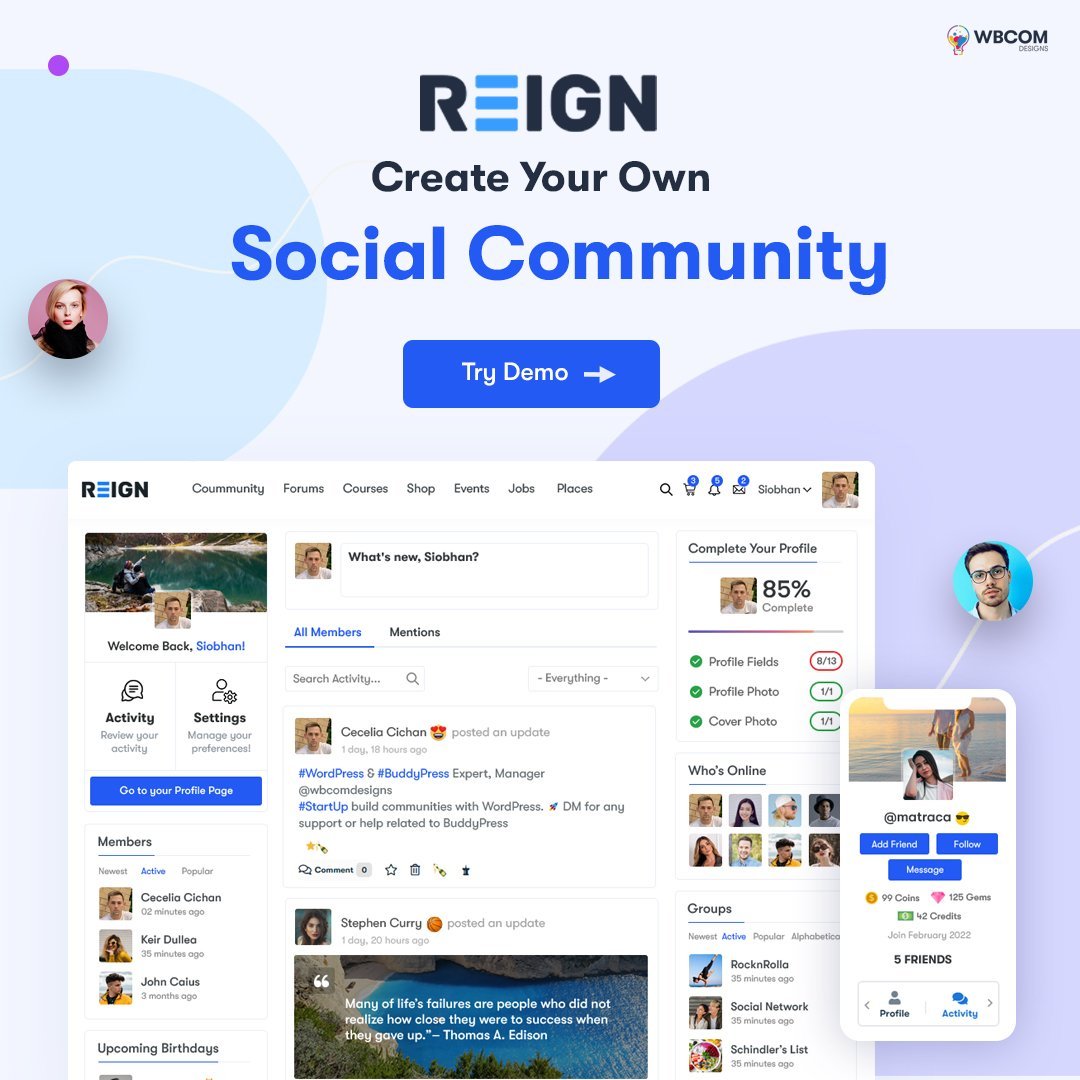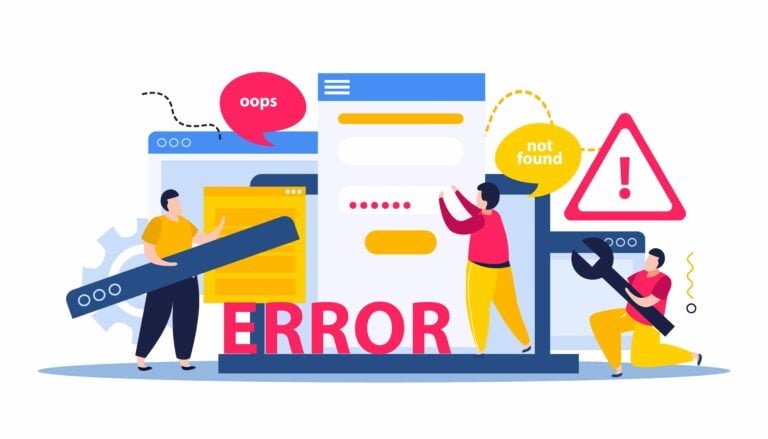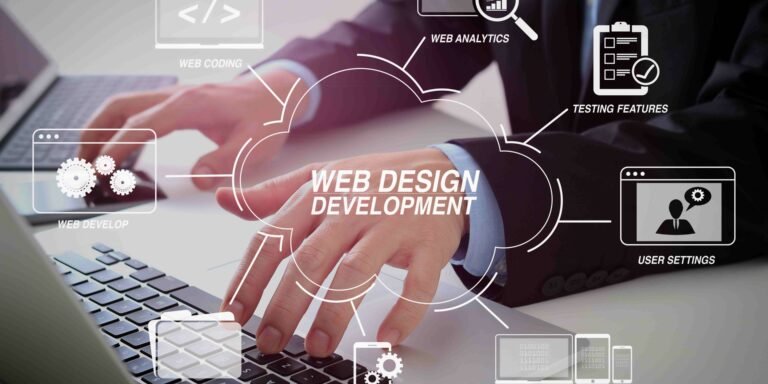Integrating Artificial Intelligence (AI) with Enterprise Resource Planning (ERP) systems has emerged as a transformative force in the manufacturing industry. In an era marked by rapid advancements in technology and automation, manufacturers are increasingly turning to AI-powered ERP solutions to optimize their operations, enhance decision-making, and stay competitive in a global marketplace.
This integration of AI and ERP, often referred to as “ERP Systems with Applied AI for Manufacturing,” represents a significant leap forward from traditional ERP systems. It empowers manufacturers with predictive analytics, machine learning, and automation capabilities, allowing them to not only manage their resources more efficiently but also harness the full potential of their data for intelligent decision support.
In this comprehensive exploration, we delve into the realms of AI-infused ERP systems, uncovering the myriad ways they are revolutionizing manufacturing processes and the tangible benefits they bring to businesses. From predictive maintenance and demand forecasting to quality control and supply chain optimization, AI-driven ERP systems are reshaping the future of manufacturing. Join us on this journey as we dissect the innovations, challenges, and best practices in implementing ERP systems with Applied AI for Manufacturing.
Table of Contents
ToggleThe Power of AI in Manufacturing
AI-driven algorithms analyze equipment data to predict maintenance needs, reducing downtime and preventing breakdowns.
- Quality Control: AI can inspect and detect defects in real time, ensuring higher product quality and consistency.
- Demand Forecasting: AI enhances forecasting accuracy by analyzing historical data, enabling efficient production planning.
- Inventory Management: AI optimizes inventory levels, minimizing excess stock while ensuring the timely availability of materials.
- Supply Chain Optimization: AI improves supply chain visibility and efficiency, reducing costs and delays.
- Process Automation: AI automates repetitive tasks, streamlining manufacturing processes and increasing productivity.
- Energy Efficiency: AI helps reduce energy consumption by optimizing equipment usage and energy-efficient scheduling.
- Customization: AI enables mass customization by adapting production processes to meet individual customer needs.
- Data-driven Decision-making: Manufacturers gain valuable insights from AI-generated analytics, aiding strategic decisions.
- Competitive Advantage: AI-equipped ERP systems provide manufacturers with a competitive edge in a rapidly evolving industry, enhancing their agility and responsiveness to market changes.
Criteria For Evaluating ERP Systems
When evaluating ERP systems for manufacturing, it’s crucial to consider several key factors that can significantly impact your business operations. Here are the essential criteria to keep in mind:
1. Industry Specificity:
- Ensure the ERP system is tailored to the unique needs of the manufacturing sector.
- Look for industry-specific features and functionalities.
2. Scalability:
- Assess the system’s ability to grow with your business.
- Ensure it can accommodate increased data volumes, users, and operations.
3. User-Friendliness:
- Prioritize a user-friendly interface for ease of adoption and reduced training time.
- Evaluate the system’s accessibility and mobile-friendliness.
4. Integration Capabilities:
- Check if the ERP system seamlessly integrates with existing software and hardware.
- Emphasize the importance of AI integration for advanced analytics and automation.
5. Customization Options:
- Determine the extent to which the ERP system can be tailored to your specific processes.
- Ensure it allows for custom workflows and reports.
6. Data Security:
- Assess the system’s security measures to protect sensitive manufacturing data.
- Look for features like data encryption and user access controls.
7. Support and Maintenance:
- Investigate the vendor’s support and maintenance offerings.
- Consider factors like software updates, training, and customer service.
8. Total Cost of Ownership (TCO):
- Calculate the TCO, including upfront costs, ongoing fees, and potential hidden expenses.
- Ensure the ERP system aligns with your budgetary constraints.
9. ROI Potential:
- Evaluate the system’s potential to deliver a substantial return on investment through improved efficiency and productivity.
10. User Feedback and References:
- Seek feedback from existing users and request references from the ERP vendor.
- Learn from others’ experiences to make an informed decision.
Considering these criteria when evaluating ERP systems ensures that you choose a solution that not only meets your current manufacturing needs but also sets the stage for future growth and technological advancement.
Also Read: Best AI Tools That Are Worth Your Time
Top ERP Systems with Applied AI
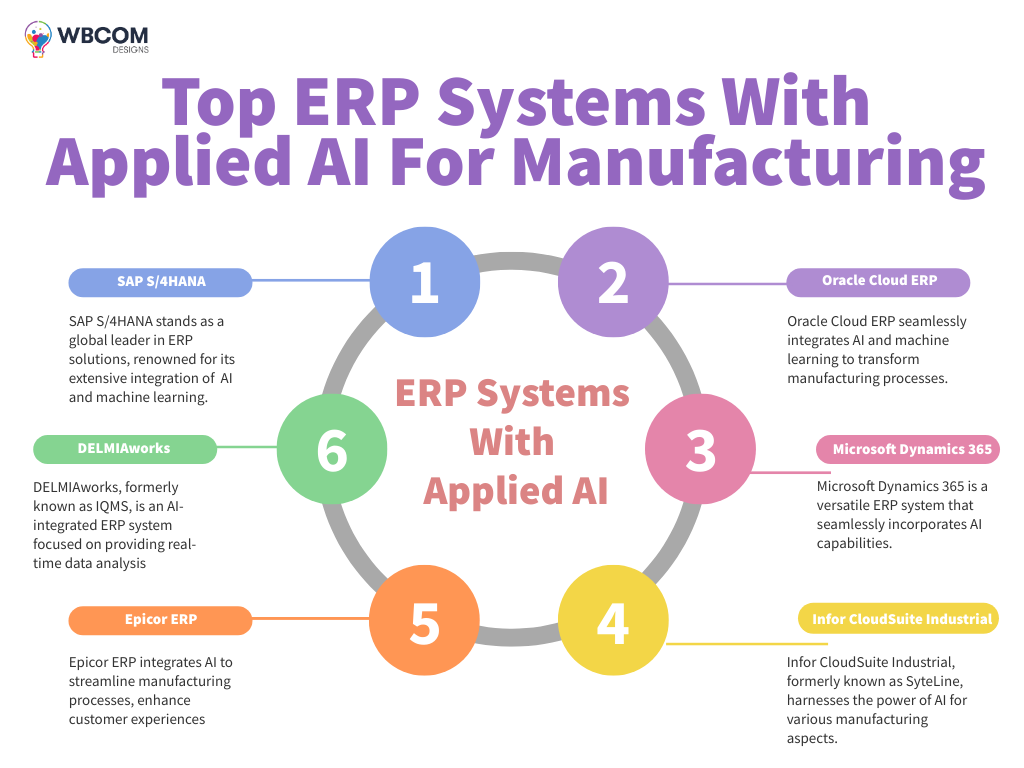
Here are ten top ERP systems known for their AI integration into manufacturing
1. SAP S/4HANA:
SAP S/4HANA stands as a global leader in ERP solutions, renowned for its extensive integration of Artificial Intelligence (AI) and machine learning. It empowers manufacturers with real-time insights and smart manufacturing capabilities, allowing for streamlined operations and data-driven decision-making. With its comprehensive suite of AI-driven features, SAP S/4HANA is a top choice for manufacturers looking to harness the power of AI for predictive maintenance, demand forecasting, and supply chain optimization.
Unique Features:
- Advanced predictive analytics and maintenance.
- IoT integration for real-time equipment monitoring.
- Automated supply chain optimization.
Benefits: SAP S/4HANA enables manufacturers to enhance operational efficiency, reduce downtime, and make informed decisions based on AI-driven insights.
2. Oracle Cloud ERP:
Oracle Cloud ERP seamlessly integrates AI and machine learning to transform manufacturing processes. It offers a wide array of AI-powered functionalities, including predictive maintenance, quality control, and supply chain optimization. This ERP system is designed to enhance efficiency, reduce costs, and improve overall business performance for manufacturers.
Unique Features:
- AI-driven predictive maintenance for equipment.
- Automated quality control and defect detection.
- Intelligent supply chain management.
Benefits: Oracle Cloud ERP empowers manufacturers to improve product quality, reduce lead times, and optimize their operations through AI-driven insights.
3. Microsoft Dynamics 365:
Microsoft Dynamics 365 is a versatile ERP system that seamlessly incorporates AI capabilities. It provides manufacturers with predictive maintenance, demand forecasting, and asset management features. This AI-infused ERP solution helps manufacturers maximize efficiency and make data-driven decisions.
Unique Features:
- Predictive maintenance to prevent equipment failures.
- AI-driven demand forecasting for better inventory management.
- Asset lifecycle management with intelligent insights.
Benefits: Microsoft Dynamics 365 enables manufacturers to boost asset reliability, optimize inventory levels, and leverage data-driven insights for improved decision-making.
4. Infor CloudSuite Industrial (SyteLine):
Infor CloudSuite Industrial, formerly known as SyteLine, harnesses the power of AI for various manufacturing aspects. It excels in AI-driven demand planning, production scheduling, and quality management, making it a robust choice for manufacturers looking to optimize their operations.
Unique Features:
- AI-based demand forecasting and planning for efficient resource allocation.
- Automated production scheduling to meet customer demands.
- Quality control empowered by predictive analytics.
Benefits: Infor CloudSuite Industrial helps manufacturers minimize stockouts, enhance production efficiency, and maintain high product quality.
5. Epicor ERP:
Epicor ERP integrates AI to streamline manufacturing processes, enhance customer experiences, and provide data-driven decision support. It is known for its ability to improve operational efficiency and competitiveness in the manufacturing sector.
Unique Features:
- AI-driven supply chain forecasting and optimization.
- Customer engagement insights for improved customer service.
- Real-time data analytics for better decision-making.
Benefits: Epicor ERP empowers manufacturers to increase supply chain efficiency, deliver superior customer service, and make well-informed decisions based on real-time data insights.
6. IQMS Manufacturing ERP (now DELMIAworks):
DELMIAworks, formerly known as IQMS, is an AI-integrated ERP system focused on providing real-time data analysis, production scheduling, and quality control. It’s designed to optimize manufacturing operations through AI-driven insights and automation.
Unique Features:
- Real-time data analysis for accurate decision-making.
- Automated production scheduling to optimize resources.
- Quality control empowered by predictive analytics.
Benefits: DELMIAworks helps manufacturers improve operational visibility, production efficiency, and product quality.
7. IFS Applications:
IFS Applications is an ERP system that effectively incorporates AI for predictive maintenance, demand forecasting, and inventory optimization. Manufacturers benefit from AI-driven insights for streamlined operations.
Unique Features:
- Predictive maintenance to minimize equipment downtime.
- AI-based demand forecasting for efficient resource allocation.
- Inventory optimization for cost reduction.
Benefits: IFS Applications enable manufacturers to enhance asset reliability, reduce operational costs, and make data-driven decisions for better inventory management.
8. NetSuite:
NetSuite, an Oracle-owned ERP system, offers AI-driven manufacturing solutions, including demand planning, production management, and supply chain optimization. It is known for its cloud-based platform and comprehensive AI capabilities.
Unique Features:
- AI-powered demand planning for accurate inventory management.
- Production management with real-time visibility.
- Supply chain optimization for cost reduction.
Benefits: NetSuite empowers manufacturers to optimize inventory levels, improve production efficiency, and make informed decisions for better supply chain management.
9. QAD Adaptive ERP:
QAD Adaptive ERP is an AI-integrated solution designed for demand-driven manufacturing, quality management, and supply chain collaboration. It offers a range of AI-driven features to optimize manufacturing processes.
Unique Features:
- Demand-driven manufacturing with AI-based insights.
- Quality management is enhanced by predictive analytics.
- Supply chain collaboration for improved coordination.
Benefits: QAD Adaptive ERP helps manufacturers reduce lead times, enhance product quality, and collaborate effectively across the supply chain.
10. PLEX Manufacturing Cloud:
PLEX Manufacturing Cloud integrates AI for smart manufacturing, offering features such as predictive analytics and real-time data insights. It empowers manufacturers with AI-driven capabilities to optimize their operations.
Unique Features:
- Predictive analytics for improved production planning.
- Real-time data insights to enhance decision-making.
- Automation for streamlined manufacturing processes.
Benefits: PLEX Manufacturing Cloud enables manufacturers to achieve higher production efficiency, data-driven decision-making, and streamlined operations.
These top ERP systems with Applied AI in manufacturing offer a wide array of features and benefits, empowering manufacturers to enhance their operations, reduce costs, and make data-driven decisions. When choosing an ERP system, it’s essential to consider the unique needs and objectives of your manufacturing business to select the solution that best aligns with your goals.
Case Studies
The successful integration of AI-powered ERP systems has yielded remarkable results for numerous companies. One notable case study is that of XYZ Manufacturing Inc., a leading automobile component manufacturer. By implementing an AI-enhanced ERP system, XYZ Manufacturing achieved predictive maintenance capabilities, allowing them to preemptively identify and address machine issues before they cause downtime. This led to a substantial reduction in unplanned downtime, saving the company millions in lost production hours.
Similarly, ABC Electronics, an electronics manufacturing giant, harnessed AI-integrated ERP to optimize its supply chain operations. Through AI-driven demand forecasting and inventory management, they significantly reduced excess inventory costs while ensuring the timely availability of components, enhancing customer satisfaction.
These case studies underscore the transformative impact of AI-powered ERP systems in manufacturing. They showcase how proactive maintenance and streamlined supply chain operations can boost efficiency, cut costs, and ultimately elevate a company’s competitiveness in the market. Such real-world successes serve as compelling evidence of the tangible benefits that AI brings to the manufacturing sector.
Also Read: Top AI Tools For Social Media 2024
Implementation Challenges and Best Practices
Address common challenges in adopting AI-integrated ERP systems in manufacturing
- Data Integration Complexity: The integration of AI into ERP systems often requires data from various sources, and ensuring seamless data integration can be challenging.
- Costs and Budgeting: Implementing AI-powered ERP systems may come with significant upfront costs, including hardware, software, and training expenses.
- Change Management: Employees may resist changes to their familiar workflows, making change management a critical challenge.
- Data Privacy and Security: Handling sensitive manufacturing data within AI systems requires robust security measures to prevent breaches.
- Skills Gap: Manufacturers may face a shortage of AI and data science skills in their workforce.
Best Practices and Tips:
- Comprehensive Data Strategy: Develop a well-thought-out data strategy to manage, clean, and integrate data effectively.
- Start Small, Scale Up: Begin with pilot projects to test AI-ERP integration before full-scale deployment.
- Employee Training: Invest in training programs to equip your workforce with the necessary AI skills.
- Data Security: Implement stringent security protocols and data encryption to protect sensitive information.
- Collaboration: Encourage cross-functional collaboration between IT, data science, and manufacturing teams.
- Continuous Monitoring: Regularly monitor and assess AI algorithms to ensure they remain effective and compliant.
By addressing these challenges and adopting these best practices, manufacturers can navigate the complexities of AI-integrated ERP implementation successfully and reap the benefits of improved efficiency and competitiveness.
Also Read: Best WordPress Plugins for CCPA and GDPR Cookie Consent 2024
Future Trends and Outlook
- AI-Driven Predictive Maintenance: Anticipate a rise in AI-driven predictive maintenance, reducing downtime and optimizing resource allocation.
- Supply Chain Automation: Expect increased automation in supply chain management, with AI-powered ERP systems streamlining logistics and inventory control.
- Enhanced Analytics: Foresee ERP systems evolving to offer more advanced analytics, enabling manufacturers to gain deeper insights from their data.
- Human-Machine Collaboration: The future might witness improved human-machine collaboration, where AI augments human decision-making rather than replacing it.
- AI-Powered Quality Control: Manufacturing quality control will likely become more precise with AI-driven systems detecting defects and anomalies in real time.
- Sustainable Manufacturing: AI and ERP integration may play a vital role in promoting sustainable practices, optimizing resource usage, and reducing waste.
- Customization: ERP systems may offer greater customization, allowing manufacturers to tailor solutions to their specific needs.
- Cloud-Based Solutions: An uptick in cloud-based ERP systems with AI capabilities is on the horizon, offering scalability and accessibility.
- Integration with IoT: Expect deeper integration of ERP, AI, and IoT for a more interconnected manufacturing ecosystem.
- Global Adoption: As technology becomes more accessible, AI-integrated ERP systems in manufacturing will likely see increased global adoption, even among smaller enterprises.
Conclusion
This blog has shed light on the transformative potential of ERP systems with Applied AI for the manufacturing sector. It has become abundantly clear that AI integration is no longer a luxury but a necessity for manufacturers aiming to thrive in today’s dynamic landscape. The key takeaways are evident: AI-driven ERP systems empower manufacturers with predictive insights, data-driven decision-making, and streamlined operations.
Choosing the right ERP system with Applied AI is not just a strategic move; it’s a pivotal step toward achieving manufacturing success. It is the path to heightened efficiency, optimized supply chains, reduced downtime, and ultimately, superior product quality. As the manufacturing industry continues to evolve, embracing these advanced technologies is not an option—it’s the blueprint for sustained growth, innovation, and competitiveness. Therefore, we encourage manufacturers to embark on their AI journey, select the right ERP system, and harness the boundless opportunities it brings for manufacturing excellence.
Interesting Reads:
Top 20 Questions About Content Marketing Asked On Google

